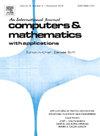AdaPW: An adaptive point-weighting method for training physics-informed neural networks
IF 2.5
2区 数学
Q1 MATHEMATICS, APPLIED
引用次数: 0
Abstract
Physics-informed neural networks (PINNs) provide a promising framework for solving partial differential equations (PDEs) through deep neural networks. One main challenge in the training of PINNs is how to quickly and effectively learn the collocation points causing big errors. In this paper, we propose an adaptive point-weighting (AdaPW) method to update the distribution of collocation-point weights not only based on their PDE residual errors but also considering the training status of the current network. In this manner, AdaPW is able to balance the attention on all collocation points so as to effectively improve the training performance. Different from the existing relevant point-weighting methods, the AdaPW method does not contain any trainable parameter, and thus has a high applicability. The theoretical analysis and numerical experiments validate the effectiveness and the superiority of the AdaPW method.
AdaPW:用于训练物理信息神经网络的自适应点加权方法
物理信息神经网络(pinn)为通过深度神经网络求解偏微分方程(PDEs)提供了一个有前途的框架。如何快速有效地学习引起较大误差的搭配点是pin训练中的一个主要挑战。本文提出了一种自适应点加权(AdaPW)方法,该方法不仅基于配位点的PDE残差,而且考虑当前网络的训练状态来更新配位点的权值分布。这样,AdaPW就可以平衡对所有搭配点的关注,从而有效地提高训练性能。与现有的相关点加权方法不同,AdaPW方法不包含任何可训练的参数,因此具有很高的适用性。理论分析和数值实验验证了该方法的有效性和优越性。
本文章由计算机程序翻译,如有差异,请以英文原文为准。
求助全文
约1分钟内获得全文
求助全文
来源期刊

Computers & Mathematics with Applications
工程技术-计算机:跨学科应用
CiteScore
5.10
自引率
10.30%
发文量
396
审稿时长
9.9 weeks
期刊介绍:
Computers & Mathematics with Applications provides a medium of exchange for those engaged in fields contributing to building successful simulations for science and engineering using Partial Differential Equations (PDEs).
 求助内容:
求助内容: 应助结果提醒方式:
应助结果提醒方式:


